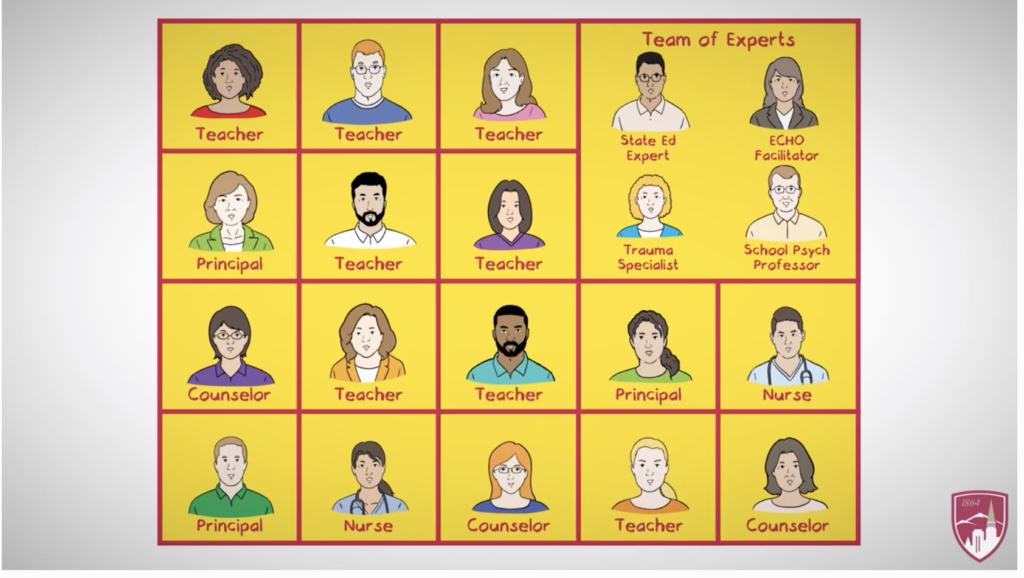ECHO-DU wraps initial pilot
In the Spring of 2018, before Dr. Phil Strain and his team from the Positive Early Learning Experiences (PELE) Center made their official move to the University of Denver Morgridge College of Education, Strain collaborated with Morgridge Dean, Dr. Karen Riley, and Dr. Elaine Belansky, director of the Center for Rural School Health & Education (CRSHE), on a pilot virtual learning series focused on early childhood education through the newly launched ECHO-DU, a hub-and-spoke model of distance learning with a home base inside Morgridge College. The three leaders, in addition to Hema Visweswaraiah, Director at Morgridge’s Fisher Early Learning Center, put together a proposal for Constellation Philanthropy, a community of individual funders working together to increase philanthropic investment in early childhood development in Colorado.
The proposal outlined a pilot project to increase the capacity of early childhood educators in underserved communities in order to provide inclusive educational opportunities for all children. According to the literature, the primary barrier to inclusion is not developmental status or cognitive or physical challenges, but rather problem behavior. Through this ECHO-DU series, educators and therapists would learn the tools to manage problem behaviors in their classrooms and create an atmosphere where children with special needs can learn with their typically developing peers. The Morgridge College team, led by Strain, would begin by teaching the Strain-authored Prevent-Teach-Reinforce for Young Children (PTRYC) method. Internally, Morgridge College would leverage the connections of Belansky in rural Colorado, its existing urban partnerships to ensure this information would be widely available to communities who need it, and the invaluable daily lived experiences of the staff from the Fisher Early Learning Center.
Through relationships, research, and reporting, Constellation Philanthropy helps donors invest wisely so all of Colorado’s children can have a great start in life. Kate Kennedy Reinemund, Executive Director of Constellation Philanthropy, was already aware of Morgridge College’s work in this arena through her personal connection to Fisher. She was blown away when Riley came to talk to her about this project.
“When Karen came to talk to us about this proposal, she had an energy that was contagious,” Reinemund recalled. “We were so impressed with the use of new technology to reach students and families who would otherwise go without.”
Other funders to Constellation, including the Anna and John J. Sie Foundation, Piton Foundation, Zoma Foundation, and many individuals, felt the same. They decided to fund the very first ECHO at the University of Denver. ECHO-DU is unique, because while most ECHO sites across the world focus on healthcare, ECHO-DU is one of a few focused on the P-20 education system. ECHO-DU participants collaborate with other educators in a case-based learning environment in order to learn about evidence-based practices and develop advanced skills related to mental health, school health-wellness, and school leadership. This pilot project would set the bar for other ECHO-DU projects and address a key finding of the Colorado Early Workforce Survey 2017, by helping teachers build the skills to meet the care and learning needs of children with special needs and challenging behaviors in order to increase the opportunities for inclusion for all children across the state.
The project launched with two ECHO-DU cohorts in the Spring of 2019. The cohorts totaled 35 participants, and each participant had direct contact with 20-25 children, for a total of 700-875 children impacted by the pilot. Additionally, participants became “specialists” in PTRYC and are now able to serve as a resource for the other teachers and children in his or her center or school, potentially impacting hundreds of additional children. The program served to build capacity, which is the vision of Project ECHO globally.
The use of ECHO-DU created a network of practitioners, especially in rural areas, who are now able to use a child and family-centered approach that, with continued implementation, could adequately support both the short and long term social and emotional outcomes of young children and inclusion. Participants were hungry for information and extremely engaged both between and within sessions; for many participants, this was their first exposure to PTRYC or to any evidence-based process for reducing challenging behavior.
“We [Constellation] look for what we call the ‘stickiness factor’,” said Reinemund. “We want to fund evidence-based, high quality programs with scalability. We love how DU takes resources and sees how they can get into the community with maximum potential.”
Strain agrees with Reinmund on the importance of the stickiness factor.
“In the course of my 45-year career I have had the good fortune to hold faculty positions in Schools of Medicine and Education,” he said. “One thing that both fields have in common is a gross disparity between known evidence-based practices and the use of these practices in typical settings.”
According to Strain, the time between vital information appearing in a journal and its appearance in everyday practice can approach two decades. He identifies this lag time as a waste of resources, depriving clients of the most effective services and disproportionately discriminating against the already underserved.
“ECHO-DU is perhaps the most effective antidote to this problem that we have,” he said. “This initial trial, generously supported by Constellation, provided invaluable data about how ECHO-DU can be utilized in the delivery of a very complex behavioral intervention for extreme problem behaviors in young children.”
As a result of the pilot, the PELE Center has adapted all of its distance training and coaching efforts to reflect ECHO-DU learnings.
“The impact of the initial gift from Constellation Philanthropy cannot be overstated,” said Riley. “It not only successfully funded this program, which will benefit hundreds of children with special needs and their families, it launched ECHO-DU and serves as an exemplar for how this technology, which was originally designed for use in medicine, can advance evidence based practices in education and other fields.”
Nancy O’Sullivan, ECHO-DU Program Manager, says it was because of Constellation’s generosity that Morgridge College was able to build much of the ECHO-DU infrastructure.
“The experience and knowledge we gained were used to successfully launch three more ECHO series within six months after finishing the PTRYC pilot,” O’Sullivan said.
Those ECHO series were: Behavioral Health Solutions for Rural Schools (CRSHE & ECHO-DU), with 68 registered participants; Empathy and Social Emotional Learning (mindSpark & ECHO-DU), with 75 registered participants; and Wellness Coordinators Make It Happen (CRSHE & ECHO-DU), with 23 registered participants.
According to O’Sullivan, “Based on our initial pilots and continued success in the virtual professional development space, we have many other groups interested in using ECHO-DU to build capacity in their region.”
Clearly, the ECHO in ECHO-DU is making an impact.
“I am so grateful to Kate Reinemund and her staff as well as all of the Constellation Philanthropy partners for their support,” Riley added. “This was a new project and their sponsorship and vision have allowed this to become a reality, resulting in lasting impact for our community for years to come.”



